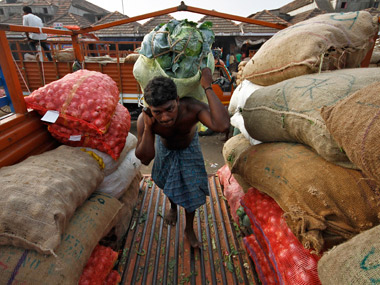Prime Minister Narendra Modi on Thursday launched an e-trading platform for agricultural products, terming it a “turning point” to ensure transparency in buying and selling of farmers’ produce across the country.
Here are the key facts you need to know about the platform:
What is the platform all about?
The Internet-based e-NAM (National Agriculture Market) is aimed at integrating ‘mandis’ to help both farmers and buyers by providing them data of produce available, its quality and the price being offered at the bidding markets. The launch is aimed at providing more options to farmers to sell their produce. “This is a turning point for the agriculture community. The agriculture sector has to be looked at holistically, and it is only then that maximum benefit of the farmer can be ensured,” said Modi on the occasion. Initially, 21 mandis from eight states have been linked to the eNAM. The government plans to link 200 mandis to the portal within five months and 585 by March 2018.
Why is this important?
The move is part of implementation of the roadmap for doubling income of the farmers by 2022, announced by Modi, about which experts have already raised doubts. In July last year, the Cabinet had approved setting up of an online national agriculture market with a budget of Rs 200 crore.
At present, farmers are restricted to selling produce at mandis that charge various taxes. The online agri-market is expected to give choice to farmers to sell their produce both in physical mandis or online platform. The easy access to sell online trade is likely to boost their incomes and improve availability, moderating price rise, agriculture minister Radha Mohan Singh had earlier claimed.
Despite the e-platform, why single market for farm produce is unlikely to be established anytime soon?
The big challenge to the plan aimed at creating a single market for farm products is going to be the APMC Act, the law that at present governs the farm produce market. The Act was passed in 1950s with the objective of bringing transparency in the agriculture markets and protecting farmers from exploitation by the moneylenders and middlemen.
Since agriculture is a state subject, state governments enacted separate APMC Acts. The Act, however, turned out to be counter productive since the Agriculture Produce Marketing Committees themselves metamorphosed into middlemen and became severely restrictive for the farmers as it took away their freedom to sell whomever they wanted to.
Highlighting the problem of APMCS, Economic Survey 2014-15 had said, “One of the most striking problems is how unintegrated and distortions-ridden are our agricultural markets. India needs a national common market for agricultural commodities by making the Agricultural Produce Market Committees (APMCs) just one among many options available for the farmers to sell their produce.”
It further said that “APMCs levy multiple fees of substantial magniture that are non-transparent and hence a source of political power”. It also noted that “these Acts created fragment markets for agricultural commodities and curtailed the freedom of farmers to sell their produce other than through the commission agents and other functionaries licensed by the APMCs”.
So without the states amending their APMC Acts creating a single agriculture market will be difficult. A report in Mint said only three states - Madhya Pradesh, Andhra Pradesh and Karnataka - have amended their APMC Acts. For the eNAM to succeed, the NDA government will have to take all the state governments on board and persuade them to amend APMC Acts and also devise laws to facilitate online trading of farm produce. Given the political power the APMCs enjoy, it is likely to be a long fight.
With inputs from agencies


)




)
)
)
)
)
)